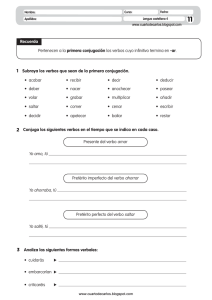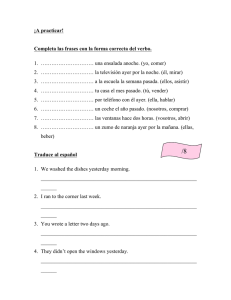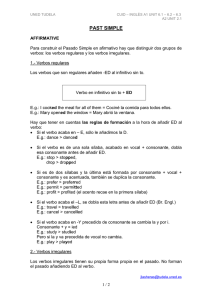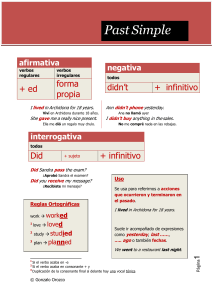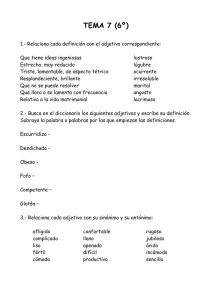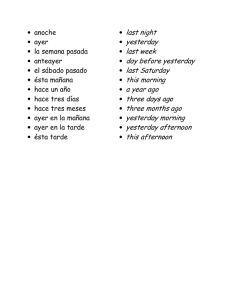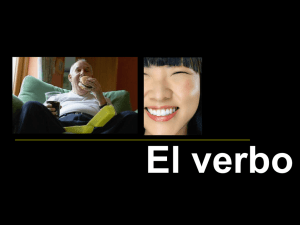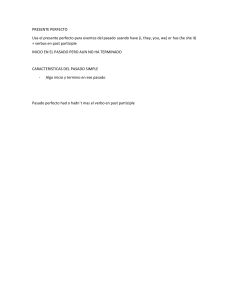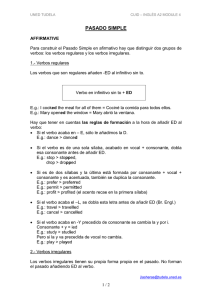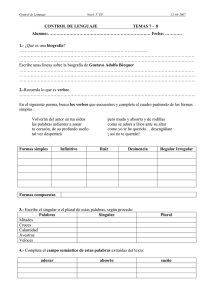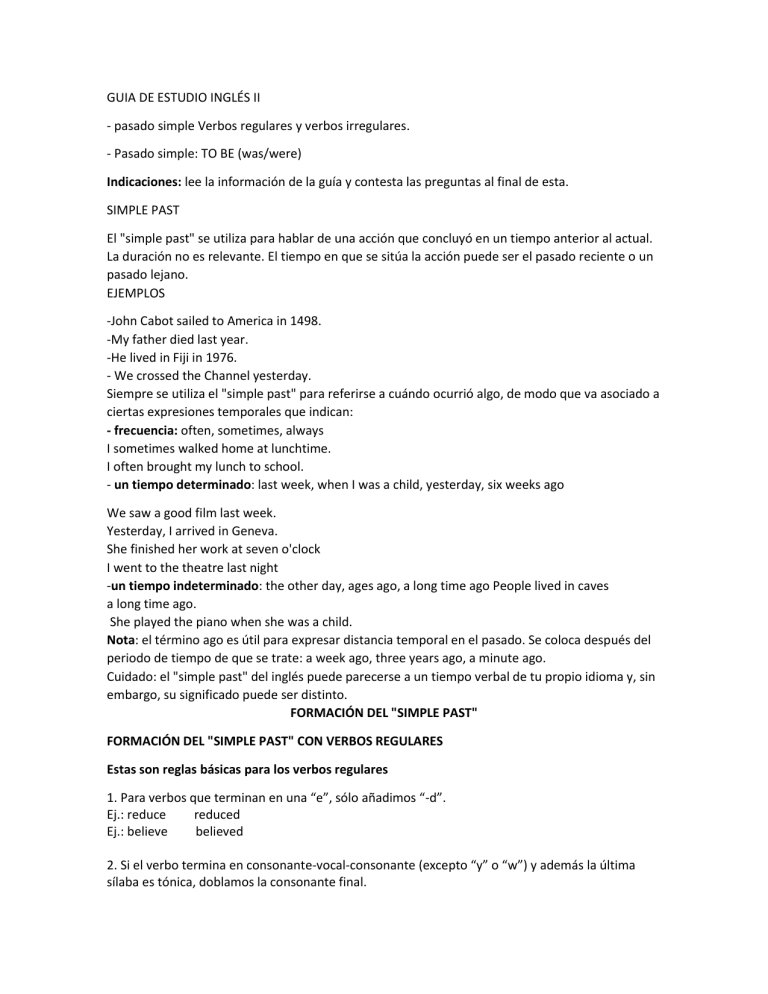
GUIA DE ESTUDIO INGLÉS II - pasado simple Verbos regulares y verbos irregulares. - Pasado simple: TO BE (was/were) Indicaciones: lee la información de la guía y contesta las preguntas al final de esta. SIMPLE PAST El "simple past" se utiliza para hablar de una acción que concluyó en un tiempo anterior al actual. La duración no es relevante. El tiempo en que se sitúa la acción puede ser el pasado reciente o un pasado lejano. EJEMPLOS -John Cabot sailed to America in 1498. -My father died last year. -He lived in Fiji in 1976. - We crossed the Channel yesterday. Siempre se utiliza el "simple past" para referirse a cuándo ocurrió algo, de modo que va asociado a ciertas expresiones temporales que indican: - frecuencia: often, sometimes, always I sometimes walked home at lunchtime. I often brought my lunch to school. - un tiempo determinado: last week, when I was a child, yesterday, six weeks ago We saw a good film last week. Yesterday, I arrived in Geneva. She finished her work at seven o'clock I went to the theatre last night -un tiempo indeterminado: the other day, ages ago, a long time ago People lived in caves a long time ago. She played the piano when she was a child. Nota: el término ago es útil para expresar distancia temporal en el pasado. Se coloca después del periodo de tiempo de que se trate: a week ago, three years ago, a minute ago. Cuidado: el "simple past" del inglés puede parecerse a un tiempo verbal de tu propio idioma y, sin embargo, su significado puede ser distinto. FORMACIÓN DEL "SIMPLE PAST" FORMACIÓN DEL "SIMPLE PAST" CON VERBOS REGULARES Estas son reglas básicas para los verbos regulares 1. Para verbos que terminan en una “e”, sólo añadimos “-d”. Ej.: reduce reduced Ej.: believe believed 2. Si el verbo termina en consonante-vocal-consonante (excepto “y” o “w”) y además la última sílaba es tónica, doblamos la consonante final. Ej.: drag Ej.: crop dragged cropped 3. Con verbos que terminan en una consonante y una “y”, se cambia la “y” por una “i”. Ej.: modify Ej.: fry modified fried Afirmativa Sujeto + raíz + ed (verbo regular en pasado) I skipped. Negativa Sujeto + did not + verbo en infinivo They didn't go. Interrogativa Did + sujeto + verbo en infinitivo Did she arrive? Interrogativa negativa Did not + sujeto + verbo en infinitivo Didn't you play? TO WALK (EJEMPLO) "SIMPLE PAST" DE LOS VERBOS TO BE Sujeto Verbo Be I was – wasn´t You were – weren´t He/She/It was We were You were They were NOTAS SOBRE LAS CONSTRUCCIONES AFIRMATIVA, NEGATIVA E INTERROGATIVA AFIRMATIVA La forma afirmativa del "simple past" es sencilla. -I was in Japan last year. - She wasn´t happy yesterday. - We were at aschool last march. NEGATIVA E INTERROGATIVA Para las formas negativa e interrogativa del "simple past" del verbo "do" como verbo ordinario, se emplea como auxiliar "do", e.g. We didn't do our homework last night. La forma negativa del verbo "have" en "simple past" suele construirse utilizando el auxiliar "do", aunque en ocasiones solo se añade not o la contracción "n't". La forma interrogativa del verbo "have" en "simple past" suele emplear el auxiliar "do". EJEMPLOS -They weren't in Rio last summer. -We didn't have any money. -We didn't have time to visit the Eiffel Tower. -We didn't do our exercises this morning. "SIMPLE PAST": VERBOS IRREGULARES Algunos verbos hacen el "simple past" de forma irregular. Estos son los más comunes. TO GO -He went to a club last night. -Did he go to the cinema last night? -He didn't go to bed early last night. TO GIVE - We gave her a doll for her birthday. - They didn't give John their new address. -Did Barry give you my passport? TO COME -My parents came to visit me last July. -We didn't come because it was raining. -Did he come to your party last week? 1.-¿Cómo se forma el pasado de un verbo regular en inglés? añadiendo -ed al principio del verbo añadiendo -yed al final del verbo añadiendo -ed al final del verbo añadiendo -s a la tercera persona del singular 2.-¿Todos los verbos en pasado se hacen igual? sí, siempre añadiendo -ed al infinitivo del verbo no, también hay verbos irregulares no, hay verbos regulares que varían un poco y hay verbos irregulares que cambian totalmente. sí, se añade -ed al infinitivo, salvo para la tercera persona del singular, que se añade -eds 3.-¿Cuál de las siguientes preguntas en pasado está bien formulada? Did you played basket yesterday? Do you play golf last week? Did they play hockey last weekend? Do they played with the dog? 4.-¿Cuál de estas frases en pasado negativo es la correcta? I did don't play football yesterday I didn't played football yesterday I do not play football yesterday I didn't play football yesterday 5.- ¿Cuál es el verbo to be en pasado para las siguientes personas? I-He-She-It Respuesta______________________ We- you- they Respuesta ______________________ 6.- Redacta dos enunciados utilizando el verbo “to be” en pasado simple en afirmativo, negativo y pregunta. Afirm. 1.____________________________________2._________________________________ Neg.1._____________________________________ 2.___________________________________ Preg.1._____________________________________ 2.___________________________________ 7: ¿Cuáles son algunas expresiones de tiempo que indican cuando sucedió algo en el pasado? _____________________________________________________________________________ 8.- ¿Cuáles son las tres reglas principales para los verbos regulares en pasado? 1.2.3.- 9.-Escribe los siguientes verbos en pasado: WORK, CLOSE, ANSWER, COPY, HOPE, LIVE TRAVEL, MIX, STOP, STAY. 1.2.3.4.5.6.7.8.9.10.10.- Escribe cinco(x3) enunciados en pasado simple en afirmativo, negativo y pregunta utilizando verbos irregulares.
